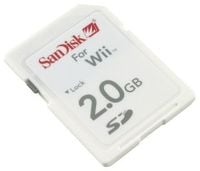SD card: Difference between revisions
| Line 10: | Line 10: | ||
==In ''[[Super Smash Bros. 4]]''== | ==In ''[[Super Smash Bros. 4]]''== | ||
The Nintendo 3DS has the ability to save downloaded software and various other types of data to an SD card, and the console even comes packaged with an SD card; the 3DS comes with a two gigabyte SD card, while the later 3DS XL and 2DS include a four gigabyte card. However, the New Nintendo 3DS and New Nintendo 3DS XL do not use an SD card; they now require a microSD card. For {{for3ds}}, various types of data are saved to the Nintendo 3DS's SD card rather than its internal memory. Save data takes up 48 "blocks" of memory (or 6 megabytes), and [[List of updates (SSB4-3DS)|the game's updates]] also take up varying amounts of space, with version 1.0. | The Nintendo 3DS has the ability to save downloaded software and various other types of data to an SD card, and the console even comes packaged with an SD card; the 3DS comes with a two gigabyte SD card, while the later 3DS XL and 2DS include a four gigabyte card. However, the New Nintendo 3DS and New Nintendo 3DS XL do not use an SD card; they now require a microSD card. For {{for3ds}}, various types of data are saved to the Nintendo 3DS's SD card rather than its internal memory. Save data takes up 48 "blocks" of memory (or 6 megabytes), and [[List of updates (SSB4-3DS)|the game's updates]] also take up varying amounts of space, with version 1.0.5 requiring 1010 blocks (or about 126.25 megabytes). Additionally, if the game is digitally downloaded via the Nintendo eShop, then all of the game's data is saved to the SD card. [[Snapshots]] also returned for ''Super Smash Bros. 4'' and are also saved to the SD card, though they can be transferred to the Nintendo 3DS's internal memory if they are accessed via the Nintendo 3DS Camera application. | ||
The Wii U version requires an SD card to take snapshots. | The Wii U version requires an SD card to take snapshots. | ||
Revision as of 11:52, February 11, 2015
Secure Digital cards, more commonly referred to as SD cards, are a digital storage medium. Initially primarily used for digital cameras, the media has since attained widespread use as a storage medium, and it has since been used on the Wii, DSi, 3DS, and Wii U as a method of storage expansion.
In Super Smash Bros. Brawl
Standard save data for Brawl is not saved to SD cards, and instead, is stored on the Wii's own flash-based memory. SD cards, however, can be used to save snapshots, custom stages and replays from the Vault in order to be used or otherwise transferred on other Wii consoles. Of note is that because of the timing of the release of Brawl, the game does not support SDHC cards, a special type of SD card that supports over 2 gigabytes of data; while the Wii was later updated to take advantage of these cards, Brawl itself cannot be natively updated to do so.
Use in hacking
Through the use of an exploit in Brawl's Stage Builder, it is possible to load customised or otherwise hacked data from an SD card. In addition to allowing for the download of The Homebrew Channel, this also allows for the loading of replacement files, as well as gameplay mods such as Project M and Balanced Brawl. Through the use of the Riivolution patcher program or a certain Ocarina code, it is also possible to force Brawl to read SDHC cards.
In Super Smash Bros. 4
The Nintendo 3DS has the ability to save downloaded software and various other types of data to an SD card, and the console even comes packaged with an SD card; the 3DS comes with a two gigabyte SD card, while the later 3DS XL and 2DS include a four gigabyte card. However, the New Nintendo 3DS and New Nintendo 3DS XL do not use an SD card; they now require a microSD card. For Super Smash Bros. for Nintendo 3DS, various types of data are saved to the Nintendo 3DS's SD card rather than its internal memory. Save data takes up 48 "blocks" of memory (or 6 megabytes), and the game's updates also take up varying amounts of space, with version 1.0.5 requiring 1010 blocks (or about 126.25 megabytes). Additionally, if the game is digitally downloaded via the Nintendo eShop, then all of the game's data is saved to the SD card. Snapshots also returned for Super Smash Bros. 4 and are also saved to the SD card, though they can be transferred to the Nintendo 3DS's internal memory if they are accessed via the Nintendo 3DS Camera application.
The Wii U version requires an SD card to take snapshots.

